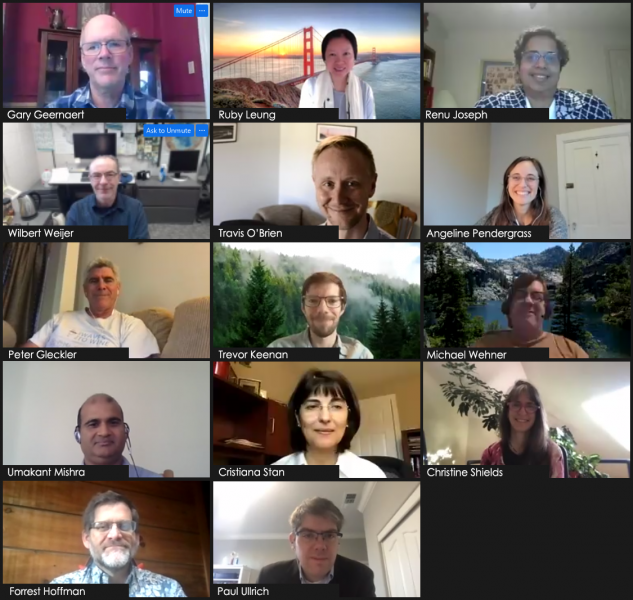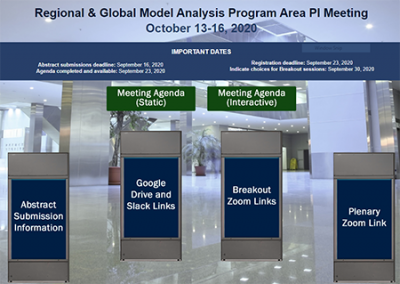The 2020 RGMA PI Meeting Brings a Community Together
Over the course of three and a half days in October, there were more than 150 scientific presentations at the 2020 Regional & Global Model Analysis (RGMA) Principal Investigator (PI) Meeting.
While the COVID-19 pandemic changed the meeting to a virtual format, RGMA Program Manager Renu Joseph says participants were highly engaged throughout the event.
“Most of our PIs shared that they were excited to be back together with familiar faces in the field,” Joseph said of the October 13 to 16 event. “In fact, more than 200 scientists gathered in our virtual space to share their latest science accomplishments via plenary and breakout room sessions.”
The full meeting content, including presentations and videos, is archived on the 2020 RGMA PI Meeting website and agenda.
Plenary Sessions Lead the Agenda
The participants were greeted with welcoming comments by Sharlene Weatherwax, Associate Director of Science for DOE Biological and Environmental Research (BER), and Gary Geernaert, Director of the Earth and Environmental Systems Sciences Division (EESSD) in the plenary. Over 30 principal investigators provided detailed overviews of RGMA-funded projects during the course of the meeting. The breadth of the RGMA funded research was visible in the broad spectrum of talks presented in the plenary sessions.
“Our PIs did a fantastic job presenting concise and compelling overviews of their science and the direction of their projects,” noted Joseph.
In addition to projects, plenary sessions featured program managers from across the relevant DOE portfolio, including updates of key projects within the Earth System Modeling Development (ESMD), Multisector Dynamics (MSD), and Data Management portfolios.
A Focus on Grand Challenges
According to Joseph, the meeting structure encouraged PIs to address the EESSD grand challenges:
- Integrated water cycle
- Biogeochemistry
- High latitudes
- Drivers and responses in the earth system
- Data-model integration
Additionally, considerable time was dedicated to discussing cross-cutting research in the following breakout sessions:
- Convection and surface-atmosphere interactions
- Synoptic to intraseasonal scale-interactions
- Extremes and impacts
- Clouds and cloud-aerosol interactions and feedbacks
- Ecosystem responses and feedbacks
- Coastal system land-atmosphere-ocean interactions
- Multi-year earth system variability, predictability, and prediction
- High latitude processes and feedbacks
Building Collaboration Across RGMA
The breakout sessions formed the backbone of the meeting with dedicated time to discussion of the 100-plus lightning presentations. These allowed PIs to engage with each other and tackle subjects from different angles, providing avenues to strengthen collaboration across projects.
A focus of the meeting was also to strengthen ties with the Energy Exascale Earth System Modeling (E3SM) Community and the Multisector Dynamics community. Some of these presentations reported on questionnaires distributed to the RGMA community ahead of the meeting that emphasized stronger ties and collaborations with these communities.
One panel discussion, for example, focused on the emerging methods using machine learning (ML) and artificial intelligence (AI) applications. Panelists addressed some of the current limitations of analysis methods used by earth systems science, and they shared their views on how emerging AI/ML methods can complement the utilization of conventional algorithms. Panelists fielded questions from the virtual audience.
A PI meeting report that focuses on current RGMA-funded science and short- and long-term research goals is in the process of being completed.
“Our meeting was carefully structured, and our PIs were very engaged from the first session until the close,” said Joseph. “I want to thank everyone for the time, hard work, and dedication it took to make this meeting a success.”
Above and Beyond the Call of Duty
 Award winners share the virtual stage with Gary Geernaert, Renu Joseph, and Cristiana Stan.
Award winners share the virtual stage with Gary Geernaert, Renu Joseph, and Cristiana Stan.During a special awards event, Geernaert presented awards to RGMA PIs for their “above and beyond the call of duty” leadership and achievements. Certificates were presented to:
- Wilbert Weijer, Los Alamos National Laboratory: “In appreciation of your leadership in conducting the first RGMA Hackathon for CMIP-6 analysis”
- Forrest Hoffman, Oak Ridge National Laboratory: “In appreciation of your leadership in conducting the first RGMA Hackathon for CMIP-6 analysis”
- Paul Ullrich, University of California, Davis: “In appreciation of your leadership in conducting the first RGMA Hackathon for CMIP-6 analysis”
- Michael Wehner, Lawrence Berkeley National Laboratory: “In appreciation of your leadership in conducting the first RGMA Hackathon for CMIP-6 analysis”
- Peter Gleckler, Lawrence Livermore National Laboratory: “In appreciation of your scientific leadership for the DOE Precipitation Metrics Workshop”
- Ruby Leung, Pacific Northwest National Laboratory: “In appreciation of your scientific leadership for the DOE Precipitation Metrics Workshop”
- Angeline Pendergrass, National Center for Atmospheric Research (NCAR): “In appreciation of your scientific leadership for the DOE Precipitation Metrics Workshop”
- Travis O’Brien, Lawrence Berkeley National Laboratory: “In appreciation for your leadership in conducting the Third Atmospheric River Transport Method Intercomparison Project (ARTMIP) Workshop”
- Christine Shields, National Center for Atmospheric Research (NCAR): “In appreciation for your leadership in conducting the Third Atmospheric River Transport Method Intercomparison Project (ARTMIP) Workshop”
- Trevor Keenan, Lawrence Berkeley National Laboratory: “In appreciation for your continuing leadership and management of the RUBISCO-AmeriFlux Working Group”
- Umakant Mishra, Sandia National Laboratories: “In appreciation of your continuing leadership and management of the RUBISCO Soil Carbon Dynamics Working Group.”

